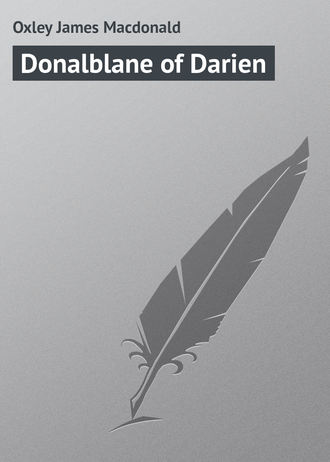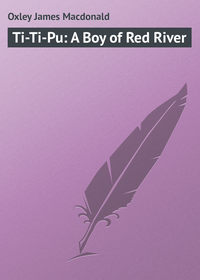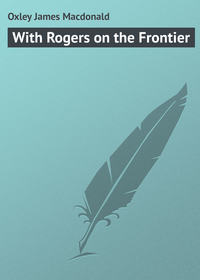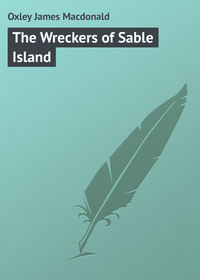 полная версия
полная версияDonalblane of Darien
He now had a chance to become acquainted with some of his fellow-passengers, the majority of whom had shared his sufferings. They were certainly a very mixed company of men, women, and children. Highlanders and lowlanders, peers and peasantry, grave ministers and gay scapegraces, shaggy shepherds from the hills, and bronzed sailor-men from the coast – a motley throng indeed, the members of which Donald studied with keen interest, for he had a sociable nature, but bore in mind the good advice given him by Mr. Paterson in regard to making acquaintances.
As it fell out, his first friend was won in a decidedly dramatic fashion. Among the occupants of the first cabin was a gentleman by name Henry Sutherland, whose wife and child, a beautiful boy of four years, accompanied him. Donald was greatly attracted by the child, and anxious to make friends with him, but had no opportunity, until one day a startling thing happened.
It was fine and warm, and the little fellow was playing happily about the quarter-deck near his mother, when a sprig of the nobility, the Hon. Hector Simpson, who had been sent out by his family in the hope of improving his habits, sauntered along, and, moved by a spirit of mischief, picked up the child, and held him over the bulwarks, saying teasingly, "How would you like to go and play with the fishes?" The mother screamed and started forward, and the child, terrified on his own account, gave so sudden and violent a wrench as to free himself from his tormentor's grasp and fall into the sea, leaving a portion of his dress in the latter's hands. Appalled by the utterly unexpected outcome of his foolish act, and unable to atone for it by springing after the child, for he could not swim a stroke, the Hon. Hector joined his shouts for help with the shrieks of the frenzied mother.
At that moment Donalblane was leaning over the bulwarks near by and feeling very lonely. He longed for friendly companionship, but was bashful about breaking the ice with any of those to whom he felt drawn, and so far no one, save Mr. Paterson, who always had a pleasant smile and kindly word for him, had taken any particular notice of him.
Now Donald was a strong, expert swimmer. He had dared the depths of many a dark loch before he left his native mountains for the coast, and at Leith he had always been one of the first to take a dip in the spring, and one of the last to give it up in the autumn. Without a question of fear, therefore, but thinking only of the pretty boy in peril of death, he threw off his coat and leaped over the bulwarks into the heaving waters. Happily the little one was still afloat when Donald's powerful strokes brought him within reach.
"There now, dearie, I've got you all safe! Dinna fear; ye'll no' droon. Keep still and ye'll be a' richt," panted Donald, as he put his left arm about the terror-stricken child.
Whether the little fellow really understood or was paralysed by fright he certainly obeyed. And well was it for them both that he did, for having cleared the brine from his eyes and got a good look at the Bonnie Scotland, Donald realised with a sinking of heart that many minutes must elapse before they could be rescued. The ship had already been brought up into the wind, and efforts were being made to lower a boat; but in the meantime his helpless burden was becoming heavier and heavier.
CHAPTER IV
A RESCUE AND A RETREAT
Well was it for both Donalblane and the child that all those on board the Bonnie Scotland did not lose their heads so completely as the young fellow whose foolish action had caused the trouble.
Among the first to take in the situation was William Paterson, and instinctively he looked about him for something to throw over after the brave boy which might serve to buoy him up until help reached him. As it happened, some one had brought on deck an empty wooden chest to serve for a seat.
"The very thing!" exclaimed Mr. Paterson when his eye fell upon it, and, without pausing to ask permission, he lifted it up and flung it over the bulwarks.
It fell not far from where Donald struck the water, and, although he did not see it at first, it presently attracted his attention.
"Eh! what's that?" he asked himself, as the black thing bobbed up and down on the waves. For a moment he feared it might be the back of a shark coming to the attack, but on a second look fear gave way to joy. "It's a box!" he cried, "and it will keep us up, if I can only get to it."
The child lay like a log, whimpering a little when the water splashed in his face; and it seemed to demand all Donald's strength just to keep from sinking, so that he did not see how he was to reach the chest, which was at least twenty yards distant.
"Wae's me!" he groaned, "but I'm near spent, and if I canna lay hold of that box, I maun droon."
Happily the wind was blowing towards him, and, although he could not make much progress against it, the chest was helped by it in his direction, so that, just when he thought he could keep up no longer, it bobbed within his reach, and, with a sigh of unutterable relief, he laid hold of it.
"Noo then, my bairnie, just get atop o' that," he said cheeringly, as he placed the child upon the chest, and held him there that he might not fall off.
The chest accepted the responsibility and bore it bravely, taking all the strain off Donald's tired arms, and enabling him to recover his strength and wind in a measure. Of course it was no easy matter to keep the little one in place with the waves so full of motion, but it was ever so much less strain than it had been before, and the sturdy boy could have maintained the struggle a little longer still, when the welcome rattle of oars and the encouraging shouts of men told him that rescue was near.
The boat came dashing up under the strenuous strokes of four brawny oarsmen, and in her bow stood William Paterson, his eager glance bent upon the two imperilled ones, and his arms outstretched ready to grasp them.
"God bless you, my noble boy!" he exclaimed, as, after tenderly lifting the child into the boat, he caught Donald under the arms to help him in. "You've taught us a lesson in heroism this day."
Donald sat down in the bow so utterly exhausted that he was hardly conscious of Mr. Paterson's warm words, nor of the hearty praise of the men, but he had an exquisite sense of relief and of having become a person of importance.
The first to greet him on the deck of the vessel were the parents of the child, and Mrs. Sutherland turned from hugging her rescued darling to throw her arms around Donald's neck and kiss him again and again, greatly to the bashful boy's embarrassment, while her husband was thumping him on the back, and exclaiming huskily, "How can I ever repay you for saving my child's life?"
It was really very trying to Donald to be the subject of such demonstration, and he was quite glad to get away from the grateful parents and the applauding crowd to his own cabin to put on some dry clothes. But when the first excitement subsided and he found that he had not only won the respect of his shipmates, but also the warm friendship of the Sutherlands, who were very fine people, he felt that the game was well worth the candle, and that he was splendidly repaid for the risk he had taken.
The first part of the long voyage across the great Atlantic Ocean was devoid of special incident. The ships presently scattered, so that each was alone in the vast expanse; and the days followed one another monotonously enough until the Bonnie Scotland sighted the Azores Islands, and, to the delight of all on board, it was announced that a call at Fayal would be made in order to replenish the supply of water.
By this time Donalblane had got a pretty good understanding of all his fellow-voyagers. His likes and dislikes were clearly defined, and, young as he was, his natural shrewdness told him that there were only too many in the company it would have been far better to have left at home.
The Sutherlands were his special friends. He had won their hearts completely, and he took great delight in the company of their little son Walter, who loved him as though he fully understood that he owed him his life.
At Fayal the four of them went ashore together, and Donalblane thought he had never before realised how pleasant it was to be on the solid ground as after these weeks of tossing about in an overcrowded ship.
"Eh, but this is bonnie!" he exclaimed enthusiastically, as his big eyes roamed over the novel and picturesque landscape. "I'd like well if this were Darien, and we need gang no farther."
Mr. Sutherland smiled at the boy's frankness. "You've evidently had enough of the Bonnie Scotland, Donald," he said. "So, too, have I. I'd be right glad to be rid both of the ship and many of her company. But we're not half-way to Darien yet."
The striking combination of rugged grandeur with tropical beauty which the Azores presented delighted Donald, and during their stay he spent the whole day ashore exploring the islands, usually in company with Mr. Sutherland. They revelled in the oranges and other fruit that were to be had almost for the asking, and Donald used to amuse Mr. Sutherland exceedingly by his lively effort to make himself understood by the inhabitants, who were chiefly Portuguese.
One adventure befell him that might have had a serious result. He had gone off wandering on his own account, and lost his way amidst the ravines which pierce the mountains in every direction, and lead one into another in a puzzling fashion. The harder he strove to extricate himself from the maze, the deeper he got into it, until at last, a little before sundown, he found himself in a regular cul-de-sac, from which there appeared to be no exit save by climbing the precipitous cliffs which shut him in, and it would soon be too dark to attempt that. "Losh me!" he sighed ruefully, "but I'm fair trapped, and what shall I do for the nicht?"
The question was more easily asked than answered. Of course to a son of the Highlands the spending of a night in the open was not a serious matter, so far as exposure was concerned; but how about danger from wild animals? This was what concerned Donalblane, and he was glad that he had put a pistol in his belt before leaving the ship. Wearied and perplexed, he had thrown himself down on the sward, when there suddenly hove in sight a big boar leading a small band of sows and piglings. He was a tusker of most forbidding appearance, and the instant his wicked little eyes fell upon Donalblane he bristled up and began gnashing his tusks ominously.
The boy sprang to his feet and drew his pistol, while he looked anxiously about him for a way of escape. "Save us a'!" he cried. "What a fearsome brute! He means ill to me, I'm thinking."
There seemed nothing for it but to stand firm and trust to his pistol. So, after a swift glance to make sure that the priming was in its place, he braced himself for the attack.
The boar did not waste much time. Having satisfied himself that this intruder upon his domain deserved no mercy, he charged fiercely at him, the foam flying from his gleaming tusks, and the thick bristles standing out on his mighty front.
Donalblane wisely waited until the fierce creature was within a few yards of him, and then fired, taking aim at the very centre of the forehead. At the report of the pistol the boar pitched forward, driving his snout into the ground, so great was his impetus, and Donalblane, thinking him dead, shouted triumphantly, "Noo, ye fool! will ye be trying to scare folk who meant ye no harm?" But his words had hardly left his lips when the boar, which had been only stunned, his tough, wrinkled hide proving an effectual shield, got upon his feet again and renewed the charge so furiously that Donalblane barely saved himself by a sudden spring aside. Baffled for the moment, the maddened brute swiftly swung round for a fresh onset, and Donalblane was fain to flee towards the cliffs, followed by the boar and his whole family, grunting and squealing.
There was no boy in Leith could out-foot him, and he dashed away at such a speed as gave him a good lead. But where was he to go, in order to escape the relentless monster that sought to rend him? And if it came to a question of endurance, the boar would assuredly run him down in the end.
CHAPTER V
ACROSS THE ATLANTIC
Running as one runs whose life is at stake, Donalblane looked hither and thither for some break in the cliffs that would give him a chance to climb out of his fell pursuers' reach. At last, with a thrill of joy, his eye perceived one, and, summoning all his energies for a supreme effort, he darted thither.
The ravening swine were gaining upon him at a rate which meant his soon being overtaken, and if he should stumble his fate was certain.
But the sure-footed faculty of the Highlander stood him in good stead. He neither slipped nor tripped, and kept steadily on, until well-nigh spent he won his race for life by so scanty a margin that the baffled boar drove hard against the friendly rock up which his intended victim had sprung to safety.
It was little more than a ledge which afforded Donalblane such timely sanctuary, and it did not lead far; but, about twenty feet from the ground, he found a sort of niche wherein he could dispose his exhausted body with some degree of comfort.
"Eh, man, but I'm well-nigh dead!" he panted, as he stretched out on the moss-covered rock. "Anither ten yards and he'd have had his tusks into me. Ah, weel, he'll no' get anither chance, though I stay here a' nicht!"
As the boar was grunting and gnashing, and his squealing family were evidently determined to invest the place, Donalblane proceeded to settle down as comfortably as he could.
Happily the moss lay thick on the rock, and really made quite a soft couch. It was a fine, warm night, and if he had only had food and drink he would not have greatly minded. But the pangs of hunger, and especially of thirst, took possession of him, and he had a wretched time of it as the long hours dragged slowly by. Some time during the night the pigs disappeared, and when day dawned the coast was clear.
Feeling very stiff and sore and out of sorts, Donalblane clambered down into the valley, and set off to find his ship. By a lucky chance, after a couple of hours' vain wandering, he came upon a couple of natives laden with oranges evidently intended for market.
They, of course, could not understand his words, but by vigorous pantomime he got into their heads the two facts, that he wanted some of their oranges, and to be shown the way to the harbour.
For a bit of silver they filled his hands with the fruit, which the starving boy found very refreshing if not quite satisfying; and then, by keeping them company, he came in due time to where the welcome sight of the Bonnie Scotland gladdened his eyes. On his return to the ship he found his friends in great concern about him, and Mr. Sutherland actually organising a party to go in search of him.
They were considerably amused at his story, and thereafter he had to endure many a joke in regard to his supposed fondness for pork.
Leaving the lovely islands with good stores of fruit, fresh provisions, and water, the Bonnie Scotland pursued her way westward through storm and {50} calm until the drawing near of the New World was announced by tropical things that came out to meet her on the bosom of the deep.
Thenceforward every eye scanned eagerly the horizon, and Donalblane spent most of his time high up the mainmast, it being his ambition to be the first among the passengers to sight the land. Mr. Paterson, whose kindly interest in the boy had increased during the voyage, promised him a golden guinea if he did sight land first, and this of course intensified his desire.
His patience was sorely tried, for when the ship reached the dreaded Sargasso Sea her onward progress was checked for many a weary day by the provoking seaweed which held her fast.
"I'm afraid you'll not soon win your guinea, Donald," said Mr. Sutherland, after they had been apparently motionless for several days. "We're bound to stay where we are until a strong wind is good enough to spring up and help us out."
But the wind seemed in no hurry to come, and the gulf-weed kept them prisoners until at last something in the nature of a hurricane struck the Bonnie Scotland, and she scudded helplessly before it under bare poles for a whole day, her passengers' impatience to sight land being for the time replaced by a lively fear of foundering.
In spite of being so poor a craft, however, the Bonnie Scotland braved out the peril, and the following morning Donalblane, who had taken to the mast as soon as he had swallowed his breakfast, made the hearts of all on deck thrill with joy by the cry of —
"The land! the land! I can see it! Look! Look!"
An instant later the look-out at the bow confirmed him by shouting —
"Land ho! on the weather bow!" and the ship-wearied folk forgot for the moment their mutual animosities which had abounded during the long voyage, and rejoiced together that the end of their trials was at hand.
"Here's your guinea, my lad," said Mr. Paterson, as he handed Donalblane a bright new coin. "You've earned it well, and I hope that good fortune may always befall you."
As Donalblane thanked his kind friend he vowed to himself that that beautiful gold piece should not be hastily spent, but that he would keep it as long as possible in memory of the giver, and the reason for the gift.
It was one of the West India Islands they were approaching, and as they passed within half-a-league its wealth of tropical vegetation presented so pleasing a picture that the passengers besought the captain to make a landing in one of the tempting coves, so that they might have a run on shore, and probably get some fruit. But he was a surly fellow, and refused the request with an oath, saying that he was sick of the whole lot of them, and wanted to be rid of them with as little delay as possible.
So the Bonnie Scotland kept on her course, leaving the lovely islands astern, and out of sight as she passed into the wide expanse of the Caribbean Sea.
Coarse and brutal as he was, her captain understood navigation, and knew how to get the best out of the old hulk of which he had command. Now, as the end of the voyage drew near, and the seas seemed kind, he cracked on all the sail the ship would carry, greatly to the delight of Donalblane, who loved to have the vessel plunging along at full speed.
More than half the breadth of the sea had been traversed when the look-out one morning shouted —
"Sail ho! Sail ho!"
"Where away?" roared the captain from the poop.
"Right abeam, and coming towards us," was the response after a moment's hesitation.
At once there was much excitement on board. The members of the expedition took it for granted that this was one of the other ships from which they had long parted company, and began to speculate which one it was, and whether it would overtake them.
"I was hoping ours would be the first vessel to reach Darien," said Mr. Sutherland to Donalblane. "It would be something to boast of considering what a poor thing she is. I wonder which one of the others this is?"
"Ye canna tell so far away," responded Donalblane. "Maybe it winna catch us. We're sailing fine now."
The Bonnie Scotland certainly was doing wonders, but in spite of every inch of canvas her sticks could carry being spread, the other ship gained steadily, and the captain's grim countenance grew darker and darker.
Mr. Paterson's fine features also became perturbed, although he kept his own counsel, and those who noticed supposed he was simply anxious that the Bonnie Scotland should win the race to Darien.
As the afternoon advanced the pursuing vessel, which seemed to be sailing two knots to the other's one, came fully into view, and everybody on board saw that it not only was not one of the five which had set out from Leith, but that it bore a strange look which somehow seemed to bode no good.
They were not long left in uncertainty. "Yon's one of they buccaneers," growled the captain; "and if ye're going to fight him off ye'd better be gettin' ready."
At once the ship was filled with alarm and confusion, women weeping, children wailing, men threatening. The very name of buccaneer sent a chill of terror to every heart, and if the blood-stained butchers of the sea had ranged alongside at that moment, the Bonnie Scotland would have proved an easy prey. But there was one man on board equal to the emergency. William Paterson had been shamefully treated by his associates, his advice flouted, his authority denied, his confidence betrayed. Now he rose superior to them all. He alone was calm amid the pitiful panic, and the first to respond to his call for concerted action were Mr. Sutherland and Donalblane.
"We must resist to the death," were his earnest words, steadily spoken. "There can be no question of surrender. The buccaneers do not know the meaning of mercy."
CHAPTER VI
A BRUSH WITH BUCCANEERS
There was no lack of arms on board the Bonnie Scotland, but they were curiously assorted, and by no means all of the best quality. Muskets and pistols, claymores and short swords, battle-axes and boarding-pikes, they were all hurriedly got out on deck, and each man chose the weapon he thought he could handle to the best advantage.
Donalblane, whose Highland spirit rather rejoiced at the prospect of a fight, snatched up a sword, which he hung at his belt in addition to his own pair of pistols.
"Can we beat the buccaneers, do you think?" he asked, looking up eagerly into the grave face of Mr. Sutherland, whose one thought was for his wife and child.
Mr. Sutherland glanced over the confused crowd of agitated men, many of whom were evidently in a state of unmanly terror, and there was an undertone of contempt in his voice as he replied —
"We ought to, if we keep our heads. There are certainly enough of us."
Counting her crew the ship carried three hundred men, and if these stood to their weapons they should prove a match for the enemy, whose numbers would probably not exceed one hundred. But the utter lack of discipline or order amongst the expedition filled both Mr. Paterson and Mr. Sutherland with fears as to the result.
In addition to small-arms, the Bonnie Scotland carried eight carronades which had been neglected during the voyage, but were now hastily got in order and double-shotted under the direction of Mr. Paterson, who seemed to know how everything should be done.
Meanwhile the buccaneer was steadily coming on, and evidently manoeuvring to approach astern so as to prevent the Bonnie Scotland using her broadside.
But the veteran captain saw through the trick, and at once changed his vessel's course, saying with a sardonic smile —
"Red Angus is no sae simple as ye think. He kens your wicked wile, and just how to fool ye."
Mr. Paterson, disgusted as he had been by the brutality of the captain during the voyage, could not help now admiring the consummate skill with which he handled his clumsy craft, for the Bonnie Scotland was far from being what she ought to have been.
He seemed to be able to divine every movement of the buccaneer, and to meet it by a counter-movement which prevented the latter obtaining the advantage sought. Thus the two vessels dodged about among the white-caps, for a strong breeze was blowing, until at last the buccaneer apparently gave up all strategy, and bore directly down upon the Bonnie Scotland at the risk of a broadside.
"Now then, gunners, be ready to fire when I give you the word," was Mr. Paterson's command, and, matches in hand, the men he had selected for the duty stood beside the carronades, waiting his word. He did not speak until the buccaneer was not more than a hundred yards distant, and then the captain, by a sudden turn of his wheel, throwing the Bonnie Scotland around so that she presented her beam to the advancing vessel, Mr. Paterson shouted —
"All together! Fire!"
The three carronades roared as one, and their iron missiles went hurtling into the rigging of the buccaneer and along her crowded decks, bringing a lot of the rigging down by the run, injuring the foremast so that it showed signs of tottering, and killing and wounding a number of the scoundrels, who were evidently not expecting so heavy a broadside. Certainly the immediate effect of the discharge was most encouraging, and Donalblane clapped his hands gleefully as the damaged vessel fell off, while the Bonnie Scotland kept on her course.







